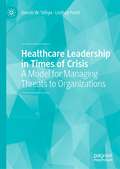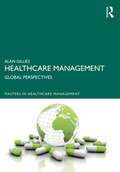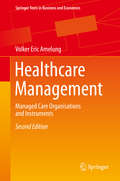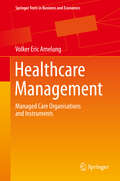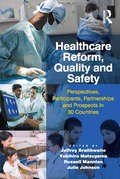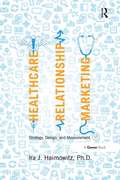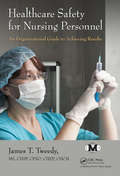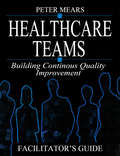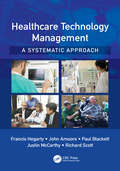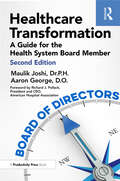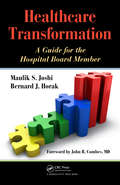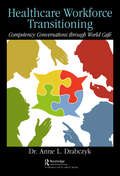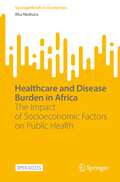- Table View
- List View
Healthcare Leadership in Times of Crisis: A Model for Managing Threats to Organizations
by Dennis W. Tafoya Lindsey PoethThis book addresses the challenges that healthcare organizations experience when attempting to manage the emergence of troublesome events or crises. It illustrates how experiences gained from event and crisis containment efforts can better prepare these organizations to prevent and/or manage other crises they may experience. Using a model outlining the relationship between a mismanaged event and the triggering of a crisis, the author defines the role of the leadership in healthcare organizations when developing, launching, and managing plans and programs to deal with these dangerous challenges brought on by crises, catastrophes, and disasters to their stakeholder networks. Readers with expertise in leadership and crisis management in general and healthcare management specifically will find this text useful in linking leadership expectations and competencies to event and crisis containment efforts.
Healthcare Made Easy: Answers to All of Your Healthcare Questions under the Affordable Care Act
by Michelle KatzAn easy-to-understand guide to the Affordable Care Act!Written by ABC World News' Real Money expert and healthcare advocate Michelle Katz, Healthcare Made Easy is the ultimate resource for understanding and navigating the Affordable Care Act. Using simple and easy-to-follow language, she answers important questions about the ACA, such as:Are there any exemptions to buying insurance under the Affordable Care Act?What is the new "80/20 Rule"? And what exactly is the Early Retiree Reinsurance Program?What does the ACA mean for small businesses? What benefits must you offer and what are the tax breaks?What is covered for your children under the new CHIP laws?How can you get pharmaceutical companies to lower your prescription costs? With the expert advice in Healthcare Made Easy, you will learn how to get the most out of your healthcare plan without having to sacrifice your needs or empty your pockets."Here is a guide, a map through the maze of healthcare decisions facing us all. Michelle has helped a lot of families. She is a champion of the consumer. A truly informed advocate." --Diane Sawyer"Michelle breaks down complicated laws and insurance regulations to make them understandable to everyone. She provides you with a road map to getting the best healthcare at the most affordable prices." --Tavis Smiley, Author, Television and Radio Host
Healthcare Management Control: A Research Overview (State of the Art in Business Research)
by Matthias Beck Michelle CarrThe COVID-19 pandemic has created unprecedented challenges to those responsible for the management of healthcare activities. These challenges require decision makers at all levels to possess a broad and comprehensive understanding of healthcare management tools, and especially of the interaction between formal control systems and the informal power dynamics which operate within healthcare organisations. Managing in healthcare is not only difficult because of the sector’s high-stakes ethical contexts but also because the health care workforce is inherently complex and heterogeneous. It is the purpose of this book to survey the expanding literature on management control in healthcare with the aim of giving readers a better understanding of the options available to managers, decision-makers and also educated observers of this important sector. This book summarises key debates and findings in this rapidly developing and increasingly important field. It explores state-of-the-art models and approaches, highlights unexplored questions and gives an outlook on novel and developing trends. In so doing it provides a hands-on-guide for aspiring healthcare managers and practitioner and offers critical insights into the more advanced academic literature for those seeking a thorough grounding in the accounting and finance aspects of healthcare management.
Healthcare Management Engineering In Action: Applying Fundamental Management Principles for Operational Decision Making in Healthcare (Business Guides on the Go)
by Alexander KolkerThe updated 2nd edition of Healthcare Management Engineering In Action in the Business Guides on the Go series provides a comprehensive exploration of healthcare management operations. Through a systematic comparison of predictive and analytic decision-making methodologies with traditional management approaches, the book employs case studies derived from real-world hospital and clinic scenarios. It addresses a spectrum of problem encompassing patient flow, capacity management, resource allocation, staffing and scheduling, statistical data analytics, and cost distribution among cooperating providers.The revised edition contains enhanced content, spotlighting key management principles vital for effective operational decision-making. The book encompasses a wide array of quantitative methods, including discrete event simulation, queuing analytic theory, linear, integer and probabilistic optimization, among others. By acting as a bridge between management engineering experts and healthcare administrators, Healthcare Management Engineering is an invaluable resource for hospital and clinic leadership, aiding them in their managerial roles. Furthermore, it serves as a comprehensive repository of introductory challenges and projects suitable for graduate-level students in healthcare management and administration.
Healthcare Management Engineering: What Does This Fancy Term Really Mean?
by Alexander KolkerThis Briefs Series book illustrates in depth a concept of healthcare management engineering and its domain for hospital and clinic operations. Predictive and analytic decision-making power of management engineering methodology is systematically compared to traditional management reasoning by applying both side by side to analyze 26 concrete operational management problems adapted from hospital and clinic practice. The problem types include: clinic, bed and operating rooms capacity; patient flow; staffing and scheduling; resource allocation and optimization; forecasting of patient volumes and seasonal variability; business intelligence and data mining; and game theory application for allocating cost savings between cooperating providers. Detailed examples of applications are provided for quantitative methods such as discrete event simulation, queuing analytic theory, linear and probabilistic optimization, forecasting of a time series, principal component decomposition of a data set and cluster analysis, and the Shapley value for fair gain sharing between cooperating participants. A summary of some fundamental management engineering principles is provided. The goal of the book is to help to bridge the gap in mutual understanding and communication between management engineering professionals and hospital and clinic administrators. The book is intended primarily for hospital/clinic leadership who are in charge of making managerial decisions. This book can also serve as a compendium of introductory problems/projects for graduate students in Healthcare Management and Administration, as well as for MBA programs with an emphasis in Healthcare.
Healthcare Management: Global Perspectives (Masters in Healthcare Management)
by Alan GilliesHealthcare Management takes a look at international perspectives in healthcare management and the way regional priorities, national income, and social factors are crucial to effective healthcare services. Readers are provided the skills to address issues and solve problems as a healthcare manager by understanding and appreciating the complex interrelationships of global health provision. The book compares and contrasts different healthcare systems, examining the role of policymaking, health financing, healthcare beyond hospitals, leadership, risk management, and quality. A range of international case studies provide the opportunity to see how different theories work in practice. This comprehensive book is suitable for students and professionals undertaking healthcare management courses.
Healthcare Management: Managed Care Organisations and Instruments (Springer Texts in Business and Economics)
by Volker Eric AmelungThis textbook on Healthcare Management provides a systematic and comprehensive overview of the organisational forms and management instruments implemented in managed care.Within the international discussion on the structure of healthcare systems, managed care is an increasingly important topic. Over more than twenty years managed care approaches have fundamentally influenced healthcare systems in terms of patient orientation, efficiency, and quality. Experts assume that up to 20% of healthcare expenses can be saved by applying high-quality managed care approaches. By using suitable organisational forms and management principles, not only can costs be reduced, but the quality of medical service provision can be augmented. Managed care is therefore much more than a cost-cutting strategy. Advocates consider managed care to be a logical and necessary developmental step in modern healthcare systems. An increase in quality and at the same time a reduction of costs is not seen as contradictory but rather as consistent. Therefore, managed care is a response to changed challenges in the provision of healthcare.
Healthcare Management: Managed Care Organisations and Instruments (Springer Texts in Business and Economics)
by Volker Eric AmelungWithin the international discussion on the structure of healthcare systems, managed care is an increasingly important topic. Over more than twenty years managed care approaches have fundamentally influenced healthcare systems in terms of patient orientation, efficiency, and quality. Experts assume that up to 20% of healthcare expenses can be saved by applying high-quality managed care approaches. By using suitable organisational forms and management principles, not only can costs be reduced, but the quality of medical service provision can be augmented. Managed care is therefore much more than a cost-cutting strategy. The goal of this book is to offer a systematic overview of the organisational forms and management instruments implemented in managed care. Advocates consider managed care to be a logical and necessary developmental step in modern healthcare systems. An increase in quality and at the same time a reduction of costs is not seen as contradictory but rather as consistent. Therefore, managed care is a response to changed challenges in the provision of healthcare.
Healthcare Operations Management: A Holistic Care Chain Perspective (SpringerBriefs in Service Science)
by Qiang SuAddressing the entire care chain, this book presents the outcomes of advanced research on healthcare operations management based on real-world data and practices in China. It includes hands-on methods and applications in this interdisciplinary research field, which combines healthcare service, operations management, industrial engineering and information technology.The content is divided into three parts, reflecting the entire care chain. The first part discusses the pre-hospital service stage and explores resource deployment problems in emergency medical service, such as ambulance allocation. The second part focuses on inpatient care services, including staffing and task allocation among nurses and doctors based on multi-project management under uncertainties. In addition, a highly promising diagnosis approach is proposed and a specific algorithm is derived on the basis of real-world datasets which can improve the diagnosis accuracy remarkably. In turn, the third part considers the post-hospital service stage, which most often takes place at community hospitals, and provides a quantitative evaluation and optimization of scheduling for tasks and team members for home care services.The book is intended for a broad audience, including students, researchers and practitioners working in various areas of healthcare management, service management, and operations management.
Healthcare Payment Systems: An Introduction
by Duane C. AbbeyHealthcare Payment Systems: An Introduction provides a complete introduction to healthcare payment systems. Written by Duane Abbey, one of the nation‘s leading experts and most sought out consultants on payment systems, this volume makes the monumental task of medical reimbursement approachable and manageable. Covering the fundamentals and terminology needed to understand this discipline, and the strategies needed to master it, Dr. Abbey will help you begin to develop the solid core of skills and knowledge needed to confidently approach payment systems as tools to use rather than hazards to avoid -- tools that will lead to improved revenue cycles and higher levels of profitability.
Healthcare Payment Systems: Fee Schedule Payment Systems
by Duane C. AbbeyFor healthcare providers and patients alike, the ways of private third-party payer payment systems can be mysterious and oftentimes quite frustrating. Payment for hospital, nursing, or homecare services can be subject to a variety of payment systems including cost-based and charge-based or those with payments that are determined in advance. Knowing
Healthcare Policy, Innovation and Digitalization: Contemporary Strategy and Approaches (Accounting, Finance, Sustainability, Governance & Fraud: Theory and Application)
by Eyüp Çetin Hilal ÖzenThis book takes a deep look at healthcare in today’s post-pandemic world. It combines both theory and application to reflect a new era for healthcare. The need for innovation, digitalization, and enhanced policies in healthcare has never been greater than it is today. Taking this need into consideration, this book offers a multidisciplinary approach to healthcare, in both managerial and clinical views. Since the book combines both qualitative and quantitative studies about healthcare, readers will receive a broad view of healthcare issues and policies in today’s world.
Healthcare Reform, Quality and Safety: Perspectives, Participants, Partnerships and Prospects in 30 Countries
by Julie Johnson Jeffrey Braithwaite Yukihiro MatsuyamaThis book offers a global perspective on healthcare reform and its relationship with efforts to improve quality and safety. It looks at the ways reforms have developed in 30 countries, and specifically the impact national reform initiatives have had on the quality and safety of care. It explores how reforms drive quality and safety improvement, and equally how they act to negate such goals. Every country included in this book is involved in a reform and improvement process, but each takes place in a particular social, cultural, economic and developmental context, leading to differing emphases and varied progress. Methods for tackling common problems - financing, efficiencies, effectiveness, evidence-based practice, institutional reforms, quality improvement, and patient safety initiatives - also differ. Representatives from each nation provide a chapter to convey their own situation. The editors draw a conclusion from these numerous contributions and synthesize the themes emerging into a coherent ’lessons learned’ summary that delivers value to the numerous stakeholders. Healthcare Reform, Quality and Safety forms a compendium of the current ’state of the art’ in global healthcare reform. This is the first book of its type, and offers a unique opportunity for cross-fertilization of ideas to the mutual benefit of countries involved in the project. The content will be of interest to governments, policymakers, managers and leaders, clinicians, teaching academics, researchers and students.
Healthcare Relationship Marketing: Strategy, Design and Measurement
by Ira J. HaimowitzIn recent years there have been dramatic changes in the pharmaceutical promotional landscape, affecting both consumers and healthcare professionals. One consequence of these dynamics is the need for pharmaceutical companies to plan new kinds of dialogue and relationships with their stakeholders. The evolution has been from mass-channel "push" marketing to two-way, multi-channel relationship marketing. Targeted Emails, webinars, mobile messages, and social networks are expanding in usage. This book is a practical overview and resource guide for the design and measurement of pharmaceutical relationship marketing (RM) programs. There are descriptions of each aspect of pharmaceutical RM design and measurement, including a running case study with follow-up exercises. The author has also conducted interviews from several pharmaceutical marketing industry experts, each having 15 years or more of working healthcare RM knowledge, and each speaking on their specific specialities. For newcomers to healthcare marketing, this book can serve as a foundation and introduction that provides framework, details, and examples of both relationship marketing designs and associated measurement disciplines. Healthcare Relationship Marketing will also be valuable to readers currently working in pharmaceutical marketing or sales who may not have exposure to the particular disciplines of relationship marketing and direct response measurement and optimization. Even for the experienced practitioner this will serve as a convenient reference that pulls together all of the program components and measurement frameworks within a single book. This book may also serve as a textbook within a university course in marketing, or a pharmaceutical business program.
Healthcare Safety for Nursing Personnel: An Organizational Guide to Achieving Results
by James T. TweedyNursing personnel play an integral role in healthcare and medical delivery organizations. Nurses not only work to keep patients safe, but must also contend with a number of safety and health risks. Illustrating the occupational risks nurses face, Healthcare Safety for Nursing Personnel: An Organizational Guide to Achieving Results addresses healthc
Healthcare Security: Solutions for Management, Operations, and Administration
by Bernard J. Scaglione Anthony LuizzoHealthcare is on a critical path, evolving with the introduction of Obama Care and now COVID-19. How will healthcare and specifically healthcare security adapt over the next few years? What tools will be necessary for healthcare security professionals and all security professionals to meet the demands of the transforming security environment? Security professionals need new tools and programs to adapt security services to the “New Normal.” As healthcare emerges from pandemic threats, active shooter and workplace violence will re-emerge and new threats related to civil unrest, fraud, mergers, and further financial struggles will change how healthcare security will function. Healthcare Security: Solutions for Management, Operations, and Administration provides a series of articles related to the management and operations of healthcare security which will assist healthcare security professionals in managing the “New Normal” now and into the future. It is a collection of previously published articles on healthcare security and general security covering various topics related to the management of healthcare security and provides information on general security operations. It also includes unconventional topics that are necessary in the administration of healthcare security such as auditing principles, fraud prevention, investigations, interview and interrogation techniques, and forensics.
Healthcare Staff Scheduling: Emerging Fuzzy Optimization Approaches
by Charles Mbohwa Michael MutingiHealthcare operations, in hospitals and home healthcare settings, are inundated with complex fuzzy features that impose difficulties in the creation of work schedules. This book presents in-depth research on emerging approaches to healthcare staff scheduling. It starts by reviewing the key issues and challenges inherent in staff scheduling, along with the basic concepts of fuzzy set theory. Examining cutting-edge research applications, it details fuzzy optimization algorithms derived from biologically inspired approaches and fuzzy theory. Facilitating a practical and in-depth understanding of modern fuzzy metaheuristic optimization approaches, the book presents recent research on multi-criteria algorithms and their applications in healthcare operations, particularly staff scheduling.
Healthcare Teams Manual: Building Continuous Quality Improvement Facilitator's Guide
by Peter MearsThis work provides the reader with an understanding of team building in a health care environment, and shows managers how to build a team that is committed to delivering quality. Topics covered include key quality concepts, team exercises, how to be a team member, team empowerment and continuous quality improvement. The facilitator's guide provides all the lesson plans, overhead projection masters and guides to all the exercises necessary for the team leader or trainer to run a teambuilding workshop.
Healthcare Technology Management - A Systematic Approach
by Richard Scott Francis Hegarty John Amoore Paul Blackett Justin McCarthyHealthcare Technology Management: A Systematic Approach offers a comprehensive description of a method for providing safe and cost effective healthcare technology management (HTM). The approach is directed to enhancing the value (benefit in relation to cost) of the medical equipment assets of healthcare organizations to best support patients, clinicians and other care providers, as well as financial stakeholders. The authors propose a management model based on interlinked strategic and operational quality cycles which, when fully realized, delivers a comprehensive and transparent methodology for implementing a HTM programme throughout a healthcare organization. The approach proposes that HTM extends beyond managing the technology in isolation to include advancing patient care through supporting the application of the technology. The book shows how to cost effectively manage medical equipment through its full life cycle, from acquisition through operational use to disposal, and to advance care, adding value to the medical equipment assets for the benefit of patients and stakeholders. This book will be of interest to practicing clinical engineers and to students and lecturers, and includes self-directed learning questions and case studies. Clinicians, Chief Executive Officers, Directors of Finance and other hospital managers with responsibility for the governance of medical equipment will also find this book of interest and value. For more information about the book, please visit the website.
Healthcare Transformation: A Guide for the Health System Board Member
by Maulik Joshi, Dr.P.H. Aaron George, DOThe purpose of this book is to offer health system board members an actionable, concise guide on their role as well as provide updates on key changes in health care delivery, including evidence and contemporary examples.The goal is for any board member to have an opportunity to not only be literate in healthcare, but to be supportive and engaged in the transformation of their organization and the industry towards improving health. Hospital and Health system board members, regardless of their experience and expertise, are challenged with keeping pace with healthcare performance and strategy. Surveys continue to show that this is not their comfort level, given healthcare complexity and the rate of recent change and targets for transformation. The aim of this book is to keep the guide concise so that all board members can become fairly literate on the major issues, with an emphasis on recent updates in healthcare, for today and the future.This is an ideal book for new board members for their orientation to the Board and for all board members to use to have a knowledge base and a set of questions to facilitate their engagement on these important issues. Much has changed since the initial printing of Healthcare Transformation in 2009, and this 2nd edition provides updated resources and more contemporary examples and lessons for both new and seasoned board members. This edition updates all chapters and provides 3 new transformers/chapters to consider.
Healthcare Transformation: A Guide for the Hospital Board Member
by Maulik Joshi Bernard HorakDesigned for easy reference, this concise manual provides hospital board members and executives with practical guidance on how to become actively engaged in the transformation of their organization. It focuses on how the healthcare industry as a whole is transforming and stresses the importance of having board members who are knowledgeable and skil
Healthcare Valuation, The Financial Appraisal of Enterprises, Assets, and Services: The Financial Appraisal Of Enterprises, Assets, And Services
by Robert James CimasiA timely look at the healthcare valuation process in an era of dynamic healthcare reform, including theory, methodology, and professional standards In light of the dynamic nature of the healthcare industry sector, the analysis supporting business valuation engagements for healthcare enterprises, assets, and services must address the expected economic conditions and events resulting from the four pillars of the healthcare industry: Reimbursement, Regulation, Competition, and Technology. Healthcare Valuation presents specific attributes of each of these enterprises, assets, and services and how research needs and valuation processes differentiate depending on the subject of the appraisal, the environment the property interest exists, and the nature of the practices. Includes theory, methodology, and professional standards as well as requisite research, analytical, and reporting functions in delivering healthcare valuation services Provides useful process tools such as worksheets and checklists, relevant case studies, plus a website that will include comprehensive glossaries and topical bibliographies Read Healthcare Valuation for a comprehensive treatise of valuation issues in the healthcare field including trends of compensation and reimbursement, technology and intellectual property, and newly emerging healthcare entities.
Healthcare Value Proposition: Creating a Culture of Excellence in Patient Experience
by Vincent K. OmachonuNever before in the healthcare industry has there been such intense emphasis and open debate on the issue of quality. The steady rise in the cost of healthcare coupled with the need for quality have combined to put the healthcare industry at the top of the national agenda. Quality, costs, and service are not just socially provocative ideas. They are critical criteria for decision-making by patients, physicians, and many key constituents of healthcare organizations. The pursuit of improved performance has driven a host of executives and managers in search of techniques for structuring, rehabilitating, redesigning, and reengineering the organizations they serve. Unfortunately, the narrow-mindedness with which programs are implemented and the discontinuity in their application weaken the promise of success. The process of quality improvement can become an undisciplined search for illusions rather than reality. For many years, healthcare managers have embraced the narrow definition of performance solely in the context of financial success. Forward-thinking executives now realize that the road to financial success begins with success in quality and service. Quality and service are no longer separate issues – they are the same. Neither one by itself will bring about lasting success. The ultimate measure of performance is in an organization’s ability to create value for its customers, and true performance must be measured in the context of the customers’ total experience. This book is about how to manage performance in the context of value to the customer or patient. It brings together the many pieces of the performance improvement puzzle – quality, technology, costs, productivity, and customer service. The author also covers process improvement tools including Lean and Six Sigma, and how to create a culture of continuous improvement as well as how to improve the patient experience and productivity improvement strategies. The book is filled with examples, illustrations, and tools for improving key aspects of a healthcare organization’s performance.
Healthcare Workforce Transitioning: Competency Conversations through World Café
by Dr. Anne DrabczykHealthcare Workforce Transitioning shares with educators and healthcare professionals alike the awareness, integration, and partnership that results from a successful process of framing a Healthcare Management Program around core competencies. To transition toward a successful healthcare career requires proficiencies in communication, leadership, professionalism, knowledge of the healthcare environment, and business skills. Competencies provide context to curriculum construction and build awareness of the role this standard plays in a career-ready workforce. Integrating professional development and service learning into co-curricular activities further strengthens outcomes. Partnering with healthcare professionals through ongoing World Café conversations, contributes a touchstone about expectations and accountabilities to be successful in a career. This book draws on the World Café methodology, guidelines, and vignettes in developing performance assessment, coaching, training, and performance reviews. The author provides lessons learned throughout the text to illustrate the points made in the chapters. It also provides a proven participatory methodology applied to competency exploration, application, and authentication.
Healthcare and Disease Burden in Africa: The Impact of Socioeconomic Factors on Public Health (SpringerBriefs in Economics)
by Ilha NiohuruThis open access book evaluates African healthcare systems from multiple perspectives. By examining empirical data from various African countries, it analyzes the effects of socioeconomic factors such as urbanization, population growth, and education on various health indicators, including the situation of health professionals, patients's decision making, health resource distribution, mortality rates, and the burden of disease. Furthermore, topics such as the use of social media in healthcare and insurance policy in Africa are addressed. This book appeals to scholars and professionals interested in healthcare in Africa.
